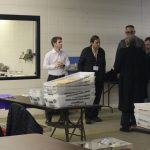Junior Achievement ensures fiscal literacy for the future

Residents of JA BizTown deposit paychecks at their bank. All photos by Patti Wenzel
One of the problems highlighted by the economic downturn of 2008 was the fiscal illiteracy of the American people. Hundreds of thousands found themselves upside-down on the mortgages, facing huge credit card debt and the loss of income – many times all at once.
Fiscal literacy, budgeting, soft job skills, and understanding of business concepts have been lost as parents failed to pass on these skills and schools cut classes in employment and life readiness in favor of reading, writing and simple arithmatic.
In this void, there is and has been Junior Achievement. The program, operating throughout Wisconsin since 1941, has as its mission to “ensure that every child has an opportunity to obtain an understanding of the free enterprise system” and “to inspire and prepare young people to succeed in a global economy.”
Junior Achievement is not like it was back in my day – meeting after school, planning a business, developing and making a product and finally selling it at the JA Fair in the spring. Now it is a full curriculum with 165,000-plus students enrolled statewide, with in-school classes and opportunities to apply the lessons learned with hands-on experiences.
Metro Milwaukee Junior Achievement recently received a boost with the opening of the JA Kohl’s Education Center. Located in the Park Place development near 107th and Good Hope Road, the facility is home to JA BizTown™ and JA Finance Park™. Both are capstone projects for elementary and middle school students, respectively.
JA Finance Park™ is just like the old Milton-Bradley classic The Game of Life™. Middle school students enter the room and are given a profile – age, occupation, marital status, children (if any), gross income, income tax bill and employment taxes. They have to make a minimum and maximum budget for the things independent adults have to have, including housing, utilities, food, clothing, furniture, transportation, phone, cable, education, entertainment, health care, insurance, investments and charitable giving. Following that exercise, they visit banks, a Realtor®, grocery, retail stores and a car dealership.
It is then that the reality of what seems like a lot of money meets the costs of the needs (and wants) of real life.
KaJaiyaiu, a student at BEAM, was assigned the role of a single, 31-year-old investment banker with a healthy net income. But even she realized that money only goes so far.
“I am learning to plan for my future and that there are consequences to certain choices,” she said.
A classmate who received a lower income, along with a spouse and two kids found out that unlimited cable and the sports car he wanted would not fit in his budget or lifestyle.
“You can’t have a two-seater when there are four people in the family.”
Suzanne Carlson, program manager of Finance Park said the kids have to start thinking like adults and quickly learn what sort of problems their parents face each day in trying to stretch a paycheck. From starting a household to learning investment and charitable habits, the students have to determine what is necessary and what it not.
Finance Park students don’t just sail through their “lives;” sometimes they are dealt an “unlucky chance” card that throws a monkey wrench into their best-laid plans. You know, a flat tire or blown furnace at the most inopportune time.
“It really makes them see the importance of saving and planning,” Carlson said.
JA BizTown™ gives elementary school students an opportunity to see firsthand how businesses run, gain work skills and build teamwork. A large, airy room serves as a simulated town complete with retail stores, manufacturing businesses, government offices, utilities, media outlets and restaurants. A town square with grass and walkways completes the area.
Each child has studied marketing, advertising, savings, credit and interest in a special Junior Achievement business education class at Pershing. They were divided into teams – retail workers, bankers, media, manufacturing, restaurant employees – and thoroughly studied their professions and developed business plans. When they arrived at the JA Kohl’s Education Center, they were ready to hit the ground running, complete with an elected government to run BizTown.
In BizTown, businesses have employees who have to work scheduled “hours.” There are material purchases, deliveries, manufacturing of products and retail sales. Employees have personal time when they deposit paychecks, shop, visit a wellness center and take part in elections. There are laws – no walking on the grass, running or fighting – which could lead to fines if broken. And of course, BizTown’s government collects taxes, just like the real world.
“This program prepares children for the future,” Pershing ESL Teacher Luz Pineda said. “This is the first year we’ve done this at Pershing, but the kids are becoming fluent in finance, learning responsibility, working in teams, knowing how to handle money and personal credit. This shows them what will really happen when they’re adults.”
At a recent public forum, MPS Superintendent Dr. Gregory Thornton described the feeling among many of the students in the district is one of hopelessness – seeing nothing in the future, no way out. Junior Achievement of Wisconsin President Tim Greinert and board chairman James Ziemer want to overpower the negative influences faced by many of students by providing more meaning to their classroom lessons and encouraging the natural optimism that is in every child.
“Statistics have shown that many students begin to lose this optimism and interest in learning as early as third grade,” Ziemer said. “We work to inspire belief in the power of choice, of self and of the responsibility young people face in owning their economic futures.”
The students at the JA Kohl’s Education Center are making those choices and decisions, learning how to deal with their future, knowing they will be familiar and prepared for what faces them in adulthood.


















